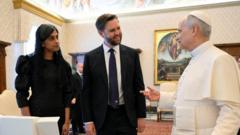In a newly released document, the Vatican stresses the necessity of ethical considerations in the development and application of artificial intelligence, highlighting its potential risks to society and the importance of maintaining human dignity in the face of technological advancement.
Vatican Raises Alarm on Ethical Use of Artificial Intelligence

Vatican Raises Alarm on Ethical Use of Artificial Intelligence
The Vatican issues a warning regarding the dangers and ethical considerations surrounding artificial intelligence, advocating for human oversight and moral responsibility.
The Vatican issued a significant alert on the implications of artificial intelligence (A.I.) on Tuesday, cautioning against its potential to usher in “the shadow of evil.” The statement underscores that while A.I. can present remarkable opportunities, it carries profound risks that warrant continuous moral and ethical scrutiny. Approved by Pope Francis, the new directive aims to guide the Catholic community on the careful interplay between A.I. technology and human values.
The Vatican document emphasizes that A.I. should serve to enhance, not supplant, human intuition and intelligence. It articulates that in every realm of decision-making, ethical dilemmas inevitably accompany advancements in technology. “The moral evaluation of this technology will need to take into account how it is directed and used,” the paper asserts, reflecting Pope Francis's enduring commitment to embedding ethical dimensions into the dialogue surrounding A.I.
The formulation of the paper drew insights from previous papal messages and social teachings, as well as discussions with A.I. experts over a period of six months. Father Paul Tighe, a key contributor, explained that the text attempts to encapsulate the essence of humanity as a framework to tackle emerging ethical questions posed by A.I. advancements.
Among the notable concerns highlighted is the risk of A.I. undermining societal trust through the proliferation of misinformation. The Vatican warns that “A.I.-generated fake media can gradually undermine the foundations of society,” demanding stringent regulations to contain its reach, particularly as misinformation gains traction and exacerbates political division and social unrest.
Another area identified is the potential for A.I. to contribute to social isolation, particularly among children, who may begin engaging in relationships through a transactional lens, akin to interactions with a chatbot. The Vatican's paper further critiques the notion that technological solutions alone can resolve complex global challenges, echoing Pope Francis's stance that true progress must also aim to rectify existing inequalities.
In relation to employment, the document argues against a future where machines replace human workers, advocating instead for a model that respects the dignity and economic well-being of individuals and families. The document stresses the need for a collective commitment from the international community to support fair wages and job security amidst advancing A.I. technologies.
Concerns also extend to military applications of A.I., where the use of remote-controlled weapons raises alarms about desensitizing perceptions of warfare’s consequences and a potential detachment from the associated human tragedies.
The Vatican cautions about the concentration of A.I. power within a handful of corporations, warning of potential manipulative capabilities that could undermine both individual autonomy and democratic processes. Pope Francis has increasingly underscored the transformative characteristics of A.I. during engagements with global leaders, viewing it as a harbinger of significant societal change.
In line with these concerns, the Vatican recently established guidelines governing A.I. usage within its own operations, reinforcing a commitment to ethical practices even within its institutional framework. The call to action from the Vatican reflects a broader, pivotal conversation about the rapidly evolving relationship between humanity and technology.





















